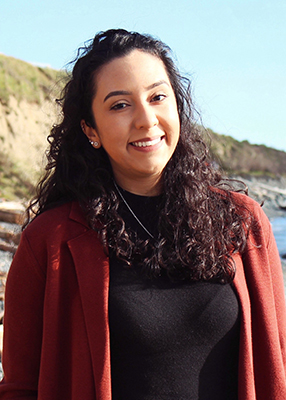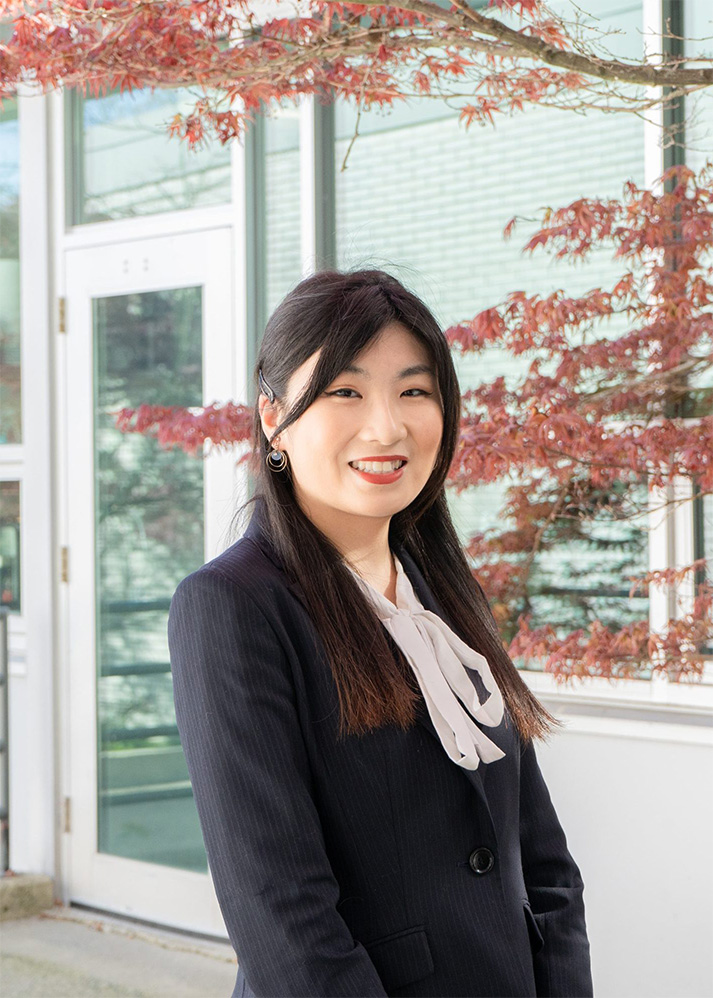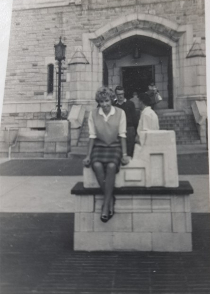Avril Espinosa-Malpica

Avril Espinosa-Malpica joined the UBC Arts Co-op program with hopes of gaining valuable experience in the workforce. Co-op was a place for her to grow professionally, make connections, and gain skills that would aid her after graduation. In addition to her placements, Avril also won UBC Arts Co-op Undergraduate Student of the Year Award in 2017.
In this interview, Avril offers insight into the co-op program, encouraging students to take initiative and help find solutions in their work place in order to build strong relationships with mangers and colleagues.
Thinking back to your co-op terms, where did you work and what was your role?
During my studies, I completed four fantastic co-op placements. My first co-op job was with the UBC Sauder School of Business, in their Development and Alumni Engagement unit, which was a great launching pad for my career. In this role, I was exposed to many prominent alumni and community leaders, which introduced me to a multitude of paths that I could follow upon graduation.
After that, I worked for the Canada Border Services Agency as a Student Border Services Officer. I learned a lot in this position, particularly in the field of international trade and border legislation, which was a super relevant stepping-stone for me to land my next position, my dream co-op job at Global Affairs Canada (GAC).
I started with GAC at their Pacific Regional Office in Vancouver, as a Trade Commissioner Assistant. I helped Canadian companies pursue international business opportunities and worked with our network at embassies abroad to support them.
The position in the Pacific Regional Office led to opportunities for me in headquarters, where I did my last co-op term in Ottawa, helping companies diversify into new export markets with the CanExport SMES funding program. Once I was able to show my strong data visualization skills, I was tasked with leading other data projects in my team. This eventually led to a promotion to my current role as Senior Analyst for all CanExport sub-programs, where I produce data analysis materials to help upper management understand and respond to program trends and challenges.
How did the Arts Co-op Program prepare you for your current career?
I think getting that experience outside of the classroom is just so essential. Because terms are only four months, the co-op program is a unique place to get a range of positions and test many career options even before graduating. It really sets you up to standout as a candidate for future jobs and helps you learn early on what you value in a career.
In terms of tangible skills, the resources that the co-op program provided on job applications continues to be extremely helpful. Being the new student intern also helped me grow my resourcefulness skills. Each position had a steep and short learning curve, so I had to learn how to quickly and independently find information, use new programs, and learn processes. Being able to adapt and quickly find a solution is something that I still feel helps me succeed in my current job, where things change everyday.
How did your career plans change throughout your co-op journey?
My co-op term motivated me to pursue a career where I could help build a diverse, sustainable and inclusive economy. It showed me that supporting companies in line with inclusive trade is one of the most effective ways that we can help solve many of our socio-economic issues, as working with the private sector is essential to build a better future. Learning about this idea through my co-op terms shaped my career trajectory and continues to motivate me in my current work.
What advice do you have for current or incoming Arts Co-op students?
I would strongly encourage students to invest time to form connections. It can be intimidating to enter the professional world, but students should try taking advantage of the access they have to knowledgeable industry professionals, as they never know how a mentor could support them later on. Keep in mind that an informal mentorship can start with being curious about your coworkers on both a professional and personal level. Find things in common, as people are more likely to offer support to those with whom they have a genuine connection. Keeping in touch is also key to establishing a solid mentorship relationship, particularly after the co-op term is done. I truly believe that you don’t have to build your career alone, so use that support!
Besides forming those relationships, try to take initiative and create your own projects – something that you can own during your co-op term. I think this helps you to not only stand out, but also gives you something that you can talk about later in other positions. Managers really appreciate someone that brings forward solutions and new ideas on their own. As a student you have a lot more to offer than you think, so don’t be afraid to share your perspective and ideas.
Besides your work terms, what were other ways you got involved in the UBC Arts Co-op program?
In my last year at UBC, I was one of the Professional Development Co-Chairs of the Arts Co-op Students’ Association (ACSA). I was responsible for planning events and workshops that helped co-op students improve their professional skills. I enjoyed connecting with other students and seeing the vast range of positions they could apply an Arts degree towards – which seemed to be everything in the private, public and non-profit sector.
I also mentored new co-op students through ACSA’s Mentorship Program. It made me see how much I had learnt and could pass on in only a couple of years.
What led you to win the Arts Co-op Undergraduate Student of the Year award? And what advice would you give to students applying for awards?
I think it was a combination of things. In my co-op position, I had a great mentor, Christian Hansen, who challenged me and gave me projects that helped me grow and show my abilities. I also think getting involved in the co-op community at UBC led me to win – as the award is not just about professional experiences. As part of the Arts Co-op Students’ Association, I served as the Professional Development Co-Chair and participated in its mentorship program to support incoming students.
Finally, I also feel I had a strong application because I was able to link and express how my co-op and university experiences would help me pursue my goals upon graduation. My genuine appreciation of the Arts Co-op Program, I believe, came through in my application and helped me win the Undergraduate Student of the Year award.
For students applying for awards, just like with any job application, make sure your answers are structured and clear but also provide detailed responses that fully answer the question. As well, this is the time to be proud and own your accomplishments – so don’t be afraid to show all you’ve done! But most importantly, don’t doubt yourself and apply even if you’re remotely interested, as you never know what could happen.
Avril Espinosa-Malpica



Avril Espinosa-Malpica joined the UBC Arts Co-op program with hopes of gaining valuable experience in the workforce. Co-op was a place for her to grow professionally, make connections, and gain skills that would aid her after graduation. In addition to her placements, Avril also won UBC Arts Co-op Undergraduate Student of the Year Award in 2017.
In this interview, Avril offers insight into the co-op program, encouraging students to take initiative and help find solutions in their work place in order to build strong relationships with mangers and colleagues.
Thinking back to your co-op terms, where did you work and what was your role?
During my studies, I completed four fantastic co-op placements. My first co-op job was with the UBC Sauder School of Business, in their Development and Alumni Engagement unit, which was a great launching pad for my career. In this role, I was exposed to many prominent alumni and community leaders, which introduced me to a multitude of paths that I could follow upon graduation.
After that, I worked for the Canada Border Services Agency as a Student Border Services Officer. I learned a lot in this position, particularly in the field of international trade and border legislation, which was a super relevant stepping-stone for me to land my next position, my dream co-op job at Global Affairs Canada (GAC).
I started with GAC at their Pacific Regional Office in Vancouver, as a Trade Commissioner Assistant. I helped Canadian companies pursue international business opportunities and worked with our network at embassies abroad to support them.
The position in the Pacific Regional Office led to opportunities for me in headquarters, where I did my last co-op term in Ottawa, helping companies diversify into new export markets with the CanExport SMES funding program. Once I was able to show my strong data visualization skills, I was tasked with leading other data projects in my team. This eventually led to a promotion to my current role as Senior Analyst for all CanExport sub-programs, where I produce data analysis materials to help upper management understand and respond to program trends and challenges.
How did the Arts Co-op Program prepare you for your current career?
I think getting that experience outside of the classroom is just so essential. Because terms are only four months, the co-op program is a unique place to get a range of positions and test many career options even before graduating. It really sets you up to standout as a candidate for future jobs and helps you learn early on what you value in a career.
In terms of tangible skills, the resources that the co-op program provided on job applications continues to be extremely helpful. Being the new student intern also helped me grow my resourcefulness skills. Each position had a steep and short learning curve, so I had to learn how to quickly and independently find information, use new programs, and learn processes. Being able to adapt and quickly find a solution is something that I still feel helps me succeed in my current job, where things change everyday.
How did your career plans change throughout your co-op journey?
My co-op term motivated me to pursue a career where I could help build a diverse, sustainable and inclusive economy. It showed me that supporting companies in line with inclusive trade is one of the most effective ways that we can help solve many of our socio-economic issues, as working with the private sector is essential to build a better future. Learning about this idea through my co-op terms shaped my career trajectory and continues to motivate me in my current work.
What advice do you have for current or incoming Arts Co-op students?
I would strongly encourage students to invest time to form connections. It can be intimidating to enter the professional world, but students should try taking advantage of the access they have to knowledgeable industry professionals, as they never know how a mentor could support them later on. Keep in mind that an informal mentorship can start with being curious about your coworkers on both a professional and personal level. Find things in common, as people are more likely to offer support to those with whom they have a genuine connection. Keeping in touch is also key to establishing a solid mentorship relationship, particularly after the co-op term is done. I truly believe that you don’t have to build your career alone, so use that support!
Besides forming those relationships, try to take initiative and create your own projects – something that you can own during your co-op term. I think this helps you to not only stand out, but also gives you something that you can talk about later in other positions. Managers really appreciate someone that brings forward solutions and new ideas on their own. As a student you have a lot more to offer than you think, so don’t be afraid to share your perspective and ideas.
Besides your work terms, what were other ways you got involved in the UBC Arts Co-op program?
In my last year at UBC, I was one of the Professional Development Co-Chairs of the Arts Co-op Students’ Association (ACSA). I was responsible for planning events and workshops that helped co-op students improve their professional skills. I enjoyed connecting with other students and seeing the vast range of positions they could apply an Arts degree towards – which seemed to be everything in the private, public and non-profit sector.
I also mentored new co-op students through ACSA’s Mentorship Program. It made me see how much I had learnt and could pass on in only a couple of years.
What led you to win the Arts Co-op Undergraduate Student of the Year award? And what advice would you give to students applying for awards?
I think it was a combination of things. In my co-op position, I had a great mentor, Christian Hansen, who challenged me and gave me projects that helped me grow and show my abilities. I also think getting involved in the co-op community at UBC led me to win – as the award is not just about professional experiences. As part of the Arts Co-op Students’ Association, I served as the Professional Development Co-Chair and participated in its mentorship program to support incoming students.
Finally, I also feel I had a strong application because I was able to link and express how my co-op and university experiences would help me pursue my goals upon graduation. My genuine appreciation of the Arts Co-op Program, I believe, came through in my application and helped me win the Undergraduate Student of the Year award.
For students applying for awards, just like with any job application, make sure your answers are structured and clear but also provide detailed responses that fully answer the question. As well, this is the time to be proud and own your accomplishments – so don’t be afraid to show all you’ve done! But most importantly, don’t doubt yourself and apply even if you’re remotely interested, as you never know what could happen.



